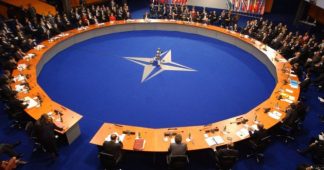Ukraine is a pawn for militarists intent on degrading Russia and ultimately China in a self-defeating quest to ensure U.S. global hegemony. The end of this war, like most proxy wars, will be ugly.
By Chris Hedges
There are many ways for a state to project power and weaken adversaries, but proxy wars are one of the most cynical. Proxy wars devour the countries they purport to defend. They entice nations or insurgents to fight for geopolitical goals that are ultimately not in their interest. The war in Ukraine has little to do with Ukrainian freedom and a lot to do with degrading the Russian military and weakening Vladimir Putin’s grip on power. And when Ukraine looks headed for defeat, or the war reaches a stalemate, Ukraine will be sacrificed like many other states, in what one of the founding members of the CIA, Miles Copeland Jr., referred to as the “Game of Nations” and “the amorality of power politics.”
I covered proxy wars in my two decades as a foreign correspondent, including in Central America where the U.S. armed the military regimes in El Salvador and Guatemala and Contra insurgents attempting to overthrow the Sandinista government in Nicaragua. I reported on the insurgency in the Punjab, a proxy war fomented by Pakistan. I covered the Kurds in northern Iraq, backed and then betrayed more than once by Iran and Washington. During my time in the Middle East, Iraq provided weapons and support to the Mujahedeen-e-Khalq (MEK) to destabilize Iran. Belgrade, when I was in the former Yugoslavia, thought by arming Bosnian and Croatian Serbs, it could absorb Bosnia and parts of Croatia into a greater Serbia.
Proxy wars are notoriously hard to control, especially when the aspirations of those doing the fighting and those sending the weapons diverge. They also have a bad habit of luring sponsors of proxy wars, as happened to the U.S. in Vietnam and Israel in Lebanon, directly into the conflict. Proxy armies are given weaponry with little accountability, significant amounts of which end up on the black market or in the hands of warlords or terrorists. CBS News reported last year that around 30 percent of the weapons sent to Ukraine make it to the front lines, a report it chose to partially retract under heavy pressure from Kyiv and Washington. The widespread diversion of donated military and medical equipment to the black market in Ukraine was also documented by U.S. journalist Lindsey Snell. Weapons in war zones are lucrative commodities. There were always large quantities for sale in the wars I covered.
Warlords, gangsters and thugs — Ukraine has long been considered one of the most corrupt countries in Europe — are transformed by sponsor states into heroic freedom fighters. Support for those fighting these proxy wars is a celebration of our supposed national virtue, especially seductive after two decades of military fiascos in the Middle East. Joe Biden, with dismal poll numbers, intends to run for a second term as a “wartime” president who stands with Ukraine, to which the U.S. has already committed $113 billion in military, economic and humanitarian assistance.
When Russia invaded Ukraine “[t]he whole world faced a test for the ages,” Biden said after a lightning visit to Kyiv. “Europe was being tested. America was being tested. NATO was being tested. All democracies were being tested.”
I heard similar sentiments expressed to justify other proxy wars.
“They are our brothers, these freedom fighters, and we owe them our help,” Ronald Reagan said of the Contras, who pillaged, raped and slaughtered their way through Nicaragua. “They are the moral equal of our Founding Fathers and the brave men and women of the French Resistance,” Reagan added. “We cannot turn away from them, for the struggle here is not right versus left, it is right versus wrong.”
“I want to hear him say we’re going to arm the Free Syrian Army,” John McCain said of President Donald Trump. “We’re going to dedicate ourselves to the removal of Bashar al-Assad. We’re going to have the Russians pay a price for their engagement. All players here are going to have to pay a penalty and the United States of America is going to be on the side of the people who fight for freedom.”
Those feted as heroes of resistance, like President Volodymyr Zelensky or President Hamid Karzai in Afghanistan, are often problematic, especially as their egos and bank accounts inflate. The flood of effusive encomiums directed towards proxies by their sponsors in public rarely matches what they say of them in private. At the Dayton peace talks, where the Serbian President Slobodan Milosevic sold out the leaders of the Bosnian Serbs and the Bosnian Croats, he said of his proxies: “[they] are not my friends. They are not my colleagues…They are shit.”
“Dark money sloshed all around,” The Washington Post wrote after obtaining an internal report produced by the Office of the Special Inspector General for Afghanistan Reconstruction.
“Afghanistan’s largest bank liquefied into a cesspool of fraud. Travelers lugged suitcases loaded with $1 million, or more, on flights leaving Kabul. Mansions known as ‘poppy palaces’ rose from the rubble to house opium kingpins. President Hamid Karzai won reelection after cronies stuffed thousands of ballot boxes. He later admitted the CIA had delivered bags of cash to his office for years, calling it ‘nothing unusual.’”
“In public, as President Barack Obama escalated the war and Congress approved billions of additional dollars in support, the commander in chief and lawmakers promised to crack down on corruption and hold crooked Afghans accountable,” the paper reported. “In reality, U.S. officials backed off, looked away and let the thievery become more entrenched than ever, according to a trove of confidential government interviews obtained by The Washington Post.”
Those lionized as the bulwark against barbarism when the arms are flowing to them, are forgotten once the conflicts end, as in Afghanistan and Iraq. The former proxy fighters must flee the country or suffer the vendettas of those they fought, as happened to the abandoned Hmong tribesmen in Laos and the South Vietnamese. The former sponsors, once lavish in military aid, ignore desperate pleas for economic and humanitarian assistance, as those displaced by war go hungry and die from lack of medical care. Afghanistan, for the second time around, is the poster child for this imperial callousness.
The collapse of civil society spawns sectarian violence and extremism, much of it inimical to the interests of those who fomented the proxy wars. Israel’s proxy militias in Lebanon, along with its military intervention in 1978 and 1982, were designed to dislodge the Palestine Liberation Organization (PLO) from the country. This objective was achieved. But the removal of the PLO from Lebanon gave rise to Hezbollah, a far more militant and effective adversary, along with Syrian domination of Lebanon. In September 1982, over three days, the Lebanese Kataeb Party, more commonly known as the Phalanges — backed by the Israeli military — massacred between 2,000 and 3,500 Palestinian refugees and Lebanese civilians in the refugee camps of Sabra and Shatila. It led to international condemnation and political unrest inside Israel. Critics called the protracted conflict “Lebanam,” conflating the words Vietnam and Lebanon. The Israeli film “Waltz with Bashir” documents the depravity and wanton killing of thousands of civilians by Israel and its proxies during the war in Lebanon.
Proxy wars, as Chalmers Johnson pointed out, engender unintended blowback. The backing of the mujahedeen in Afghanistan fighting the Soviets, which included arming groups such as those led by Osama bin Laden, gave rise to the Taliban and al-Qaeda. It also spread reactionary jihadism throughout the Muslim world, increased terrorist attacks against western targets which culminated in the attacks of 9/11 and fueled two decades of U.S.-led military fiascos in Afghanistan, Iraq, Syria, Somalia, Libya and Yemen.
Should Russia prevail in Ukraine, should Putin not be removed from power, the U.S. will have not only cemented into place a potent alliance between Russia and China, but ensured an antagonism with Russia that will come back to haunt us. The flood of billions of dollars of weapons into Ukraine, the use of U.S. intelligence to kill Russian generals and sink the battleship Moskva, the blowing up of the Nord Stream pipelines and the more than 2,500 U.S. sanctions targeting Russia, will not be forgotten by Moscow.
“In a sense, blowback is simply another way of saying that a nation reaps what it sows,” Johnson writes,“Although people usually know what they have sown, our national experience of blowback is seldom imagined in such terms because so much of what the managers of the American empire have sown has been kept secret.”
Those supported in proxy wars, including the Ukrainians, often have little chance of victory. Sophisticated weapons such as the M1 Abrams tanks are largely useless if those operating them have not spent months and years being trained. Prior to the Israeli invasion of Lebanon in June 1982, the Soviet bloc provided Palestinian fighters with heavy weapons, including tanks, anti-aircraft missiles and artillery. The lack of training made those weapons ineffective against Israeli air power, artillery and mechanized units.
The U.S. knows time is running out for Ukraine. It knows that high-tech weapons will not be mastered in time to blunt a sustained Russian offensive. Defense Secretary Lloyd Austin warned in January that Ukraine has “a window of opportunity here, between now and the spring.” “That’s not a long time,” he added.
Victory, however, is not the point. The point is maximum destruction. Even if Ukraine is forced in defeat to negotiate with Russia and concede territory for peace, as well as accept status as a neutral nation, Washington will have achieved its primary goal of weakening Russia’s military capacity and isolating Putin from Europe.
Those who mount proxy wars are blinded by wishful illusions. There was little support for the Contras in Nicaragua or the MEK in Iran. The arming of so-called “moderate” rebels in Syria saw weapons flow into the hands of reactionary jihadists.
The conclusion of proxy wars usually sees the nation or group fighting on behalf of the sponsor state betrayed. In 1972, the Nixon administration provided millions of dollars in weapons and ammunition to Kurdish rebels in northern Iraq to weaken the Iraqi government, which at the time was seen as too close to the Soviet Union. No one, least of all the U.S. and Iran, which delivered the weapons to Kurdish fighters, wanted the Kurds to create a state of their own. Iraq and Iran signed the 1975 Algiers Agreement in which the two countries settled disputes along their common border. The agreement also ended military support for the Kurds.
The Iraqi military soon launched a ruthless campaign of ethnic cleansing in northern Iraq. Thousands of Kurds, including women and children, were “disappeared” or killed. Kurdish villages were dynamited into rubble. The desperate plight of the Kurds was ignored, for, as Henry Kissinger said at the time, “covert action should not be confused with missionary work.”
The Islamic government in Tehran resumed military aid to the Kurds during the war between Iran and Iraq from 1980 to 1988. On March 16, 1988, Iraqi President Saddam Hussein dropped mustard gas and the nerve agents sarin, tabun, and VX on the Kurdish town of Halabja. Some 5,000 people died within minutes and up to 10,000 were injured. The Reagan administration, which supported Iraq, minimized the war crimes committed against its former Kurdish allies.
President Richard Nixon’s rapprochement towards China, in another example, included terminating covert assistance to Tibetan rebels.
Betrayal is the closing act in nearly all proxy wars.
The arming of Ukraine is not missionary work. It has nothing to do with liberty or freedom. It is about weakening Russia. Take Russia out of the equation and there would be little tangible support for Ukraine. There are other occupied peoples, including the Palestinians, who have suffered as brutally and far longer than Ukranians. But NATO is not arming Palestinians to fight against their Israeli occupiers or holding them up as heroic freedom fighters. Our love of freedom does not extend to Palestinians or the people of Yemen currently being bombed with British and American weapons, or the Kurds, Yazidis and Arabs resisting Turkey, a longtime NATO member, in its occupation and drone war throughout the north and east of Syria. Our love of freedom only extends to people who serve our “national interest.”
There will come a time when the Ukrainians, like the Kurds, will become expendable. They will disappear, as many others before them have, from our national discourse and our consciousness. They will nurse for generations their betrayal and suffering. The American empire will move on to use others, perhaps the “heroic” people of Taiwan, to further its futile quest for global hegemony. China is the big prize for our Dr. Strangeloves. They will pile up even more corpses and flirt with nuclear war to curtail China’s growing economic and military power. This is an old and predictable game. It leaves in its wake nations in ruins and millions of people dead and displaced. It fuels the hubris and self-delusion of the mandarins in Washington who refuse to accept the emergence of a multipolar world. If left unchecked, this “game of nations” may get us all killed.
We remind our readers that publication of articles on our site does not mean that we agree with what is written. Our policy is to publish anything which we consider of interest, so as to assist our readers in forming their opinions. Sometimes we even publish articles with which we totally disagree, since we believe it is important for our readers to be informed on as wide a spectrum of views as possible.











